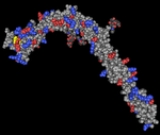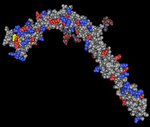
Anti-apolipoprotein antibodies
Encyclopedia
In autoimmune disease, anti-apolipoprotein H
(AAHA) antibodies, also called anti-β2 glycoprotein I antibodies, comprise a subset of anti-cardiolipin antibodies
and lupus anticoagulant
. These antibodies are involved in sclerosis and are strongly associated with thrombotic forms of lupus.. As a result AAHA are strongly implicated in autoimmune deep vein thrombosis
.
Also, it was proposed that AAHA is responsible for lupus anticoagulant
. However, antiphospholipid
antibodies bind phospholipids at sites similar to sites bound by anti-coagulants such as PAP1 sites and augment anti-coagulation activity.
This contrasts with the major, specific, activity of AAHA, defining a subset of anti-cardiolipin antibodies
that specifically interacts with Apo-H. AHAA only inhibits the anti-coagulation activity in the presence of Apo-H and the AAHA component of ACLA correlates with a history of frequent thrombosis.. This can be contrasted with lupus anticoagulant
which inhibits agglutination in the presence of thrombin. A subset of AHAA appear to mimic the activity of lupus anticoagulant and increase Apo-H binding to phospholipids. These two activities can be differentiated by the binding to Apo-H domains, whereas binding to the 5th domain promotes that anti-coagulant activity binding to the more N-terminal domains promotes lupus anticoagulant-like activities.
 AAHA interferes with factor Xa inhibition by Apo-H increasing factor Xa generation. However, like Apo-H the Lupus anticoagulant inhibits factor Xa generation.
AAHA interferes with factor Xa inhibition by Apo-H increasing factor Xa generation. However, like Apo-H the Lupus anticoagulant inhibits factor Xa generation.
AAHA also inhibited the autoactivation of factor XII while at high AAHA concentrations, factor XIIa activation increases at levels comparable to Apo-H that cause inhibition of factor XIIa activation. A synchronized inhibition of factor XII autoactivation by Apo-H and AHAA has been suggested.
-DQ3
appears to play a role in the pathogenic AAHA production. The alleles primarily recognized are HLA-DR53
(DRB4*01), DRB1*0402, DQA1*03, and possibly DQB1*0302. All of these alleles are in linkage disequilbrium in the DRB4*01:DRB1*0402:DQA1*0301:DQB1*0302 haplotype, also called DR4-DQ8 and also the DQA1:0303:DQB1*0301 haplotype, DR4-DQ7.3. However in European Americans which reflects a broad area of Europe in which the original studies were conducted only DR4(0402)-DQ8
was found, indicating that the entire haplotype is involved.
HLA-DR7
may also be associated with these antibodies and the common haplotype association is the HLA-DR53
serotype.
Apolipoprotein H
Apolipoprotein H , previously known as , is a multifunctional apolipoprotein. One of its functions is to bind cardiolipin. When bound the structure of cardiolipin and Apo-H both undergo large changes in structure...
(AAHA) antibodies, also called anti-β2 glycoprotein I antibodies, comprise a subset of anti-cardiolipin antibodies
Anti-cardiolipin antibodies
Anti-cardiolipin antibodies are antibodies often directed against cardiolipin and found in several diseases including syphilis, antiphospholipid syndrome, livedoid vasculitis, vertebrobasilar insufficiency, Behçet's syndrome, idiopathic spontaneous abortion, and systemic lupus erythematosus. They...
and lupus anticoagulant
Lupus anticoagulant
Lupus anticoagulant is an immunoglobulin that binds to phospholipids and proteins associated with the cell membrane. It is important to note that this disease name is actually a misnomer...
. These antibodies are involved in sclerosis and are strongly associated with thrombotic forms of lupus.. As a result AAHA are strongly implicated in autoimmune deep vein thrombosis
Deep vein thrombosis
Deep vein thrombosis is the formation of a blood clot in a deep vein. Deep vein thrombosis commonly affects the leg veins or the deep veins of the pelvis. Occasionally the veins of the arm are affected...
.
Also, it was proposed that AAHA is responsible for lupus anticoagulant
Lupus anticoagulant
Lupus anticoagulant is an immunoglobulin that binds to phospholipids and proteins associated with the cell membrane. It is important to note that this disease name is actually a misnomer...
. However, antiphospholipid
Antiphospholipid syndrome
Antiphospholipid syndrome or antiphospholipid antibody syndrome , often also Hughes syndrome, is an autoimmune, hypercoagulable state caused by antibodies against cell-membrane phospholipids that provokes blood clots in both arteries and veins as well as pregnancy-related complications such as...
antibodies bind phospholipids at sites similar to sites bound by anti-coagulants such as PAP1 sites and augment anti-coagulation activity.
This contrasts with the major, specific, activity of AAHA, defining a subset of anti-cardiolipin antibodies
Anti-cardiolipin antibodies
Anti-cardiolipin antibodies are antibodies often directed against cardiolipin and found in several diseases including syphilis, antiphospholipid syndrome, livedoid vasculitis, vertebrobasilar insufficiency, Behçet's syndrome, idiopathic spontaneous abortion, and systemic lupus erythematosus. They...
that specifically interacts with Apo-H. AHAA only inhibits the anti-coagulation activity in the presence of Apo-H and the AAHA component of ACLA correlates with a history of frequent thrombosis.. This can be contrasted with lupus anticoagulant
Lupus anticoagulant
Lupus anticoagulant is an immunoglobulin that binds to phospholipids and proteins associated with the cell membrane. It is important to note that this disease name is actually a misnomer...
which inhibits agglutination in the presence of thrombin. A subset of AHAA appear to mimic the activity of lupus anticoagulant and increase Apo-H binding to phospholipids. These two activities can be differentiated by the binding to Apo-H domains, whereas binding to the 5th domain promotes that anti-coagulant activity binding to the more N-terminal domains promotes lupus anticoagulant-like activities.

AAHA also inhibited the autoactivation of factor XII while at high AAHA concentrations, factor XIIa activation increases at levels comparable to Apo-H that cause inhibition of factor XIIa activation. A synchronized inhibition of factor XII autoactivation by Apo-H and AHAA has been suggested.
Genetics
The hapolotype HLA-DR4HLA-DR4
HLA-DR4 is a HLA-DR serotype that recognizes the DRB1*04 gene products. The DR4 serogroup is large and has a number ofmoderate frequency alleles spread over large regions of the world.-Serology:The serological identification of DR4 is good...
-DQ3
HLA-DQ3
HLA-DQ3 is a broad serotype category with split antigens HLA-DQ7, DQ8, and DQ9. Historically, originally recognized as MB3 a DC4 serotype, DQw3 was one of three early determined antigens recognized as HLA-DQ along with HLA-DQ1 and HLA-DQ2...
appears to play a role in the pathogenic AAHA production. The alleles primarily recognized are HLA-DR53
HLA-DR53
HLA-DR53 is an HLA-DR serotype that recognizes gene products of HLA-DRB4 locus. There are 13 alleles at this locus that encode 7 proteins.DRB3, DRB4, and DRB5 are minor DR beta encoding loci, they have been recognized as having distinct evolution. and the DRB4 locus presence is linked to HLA-DR7...
(DRB4*01), DRB1*0402, DQA1*03, and possibly DQB1*0302. All of these alleles are in linkage disequilbrium in the DRB4*01:DRB1*0402:DQA1*0301:DQB1*0302 haplotype, also called DR4-DQ8 and also the DQA1:0303:DQB1*0301 haplotype, DR4-DQ7.3. However in European Americans which reflects a broad area of Europe in which the original studies were conducted only DR4(0402)-DQ8
HLA-DQ8
HLA-DQ8 is a human leukocyte antigen serotype within the HLA-DQ serotype group. DQ8 is a split antigen of the DQ3 broad antigen. DQ8 is determined by the antibody recognition of β8 and this generally detects the gene product of DQB1*0302....
was found, indicating that the entire haplotype is involved.
HLA-DR7
HLA-DR7
HLA-DR7 is a HLA-DR serotype that recognizes the DRB1*0701 to *0705 gene products.-Serology:The serological reaction of DR7 is excellent for *0701. The serology of *0703 to *0705 to *0709, and *0711 to *0714 serotypes is unknown. DRB1*0710N is a null allele. DRB1*0702 nomenclature has been...
may also be associated with these antibodies and the common haplotype association is the HLA-DR53
HLA-DR53
HLA-DR53 is an HLA-DR serotype that recognizes gene products of HLA-DRB4 locus. There are 13 alleles at this locus that encode 7 proteins.DRB3, DRB4, and DRB5 are minor DR beta encoding loci, they have been recognized as having distinct evolution. and the DRB4 locus presence is linked to HLA-DR7...
serotype.

